美国生物信息学专业介绍:
生物信息学是一门利用计算机技术研究生物系统之规律的学科。
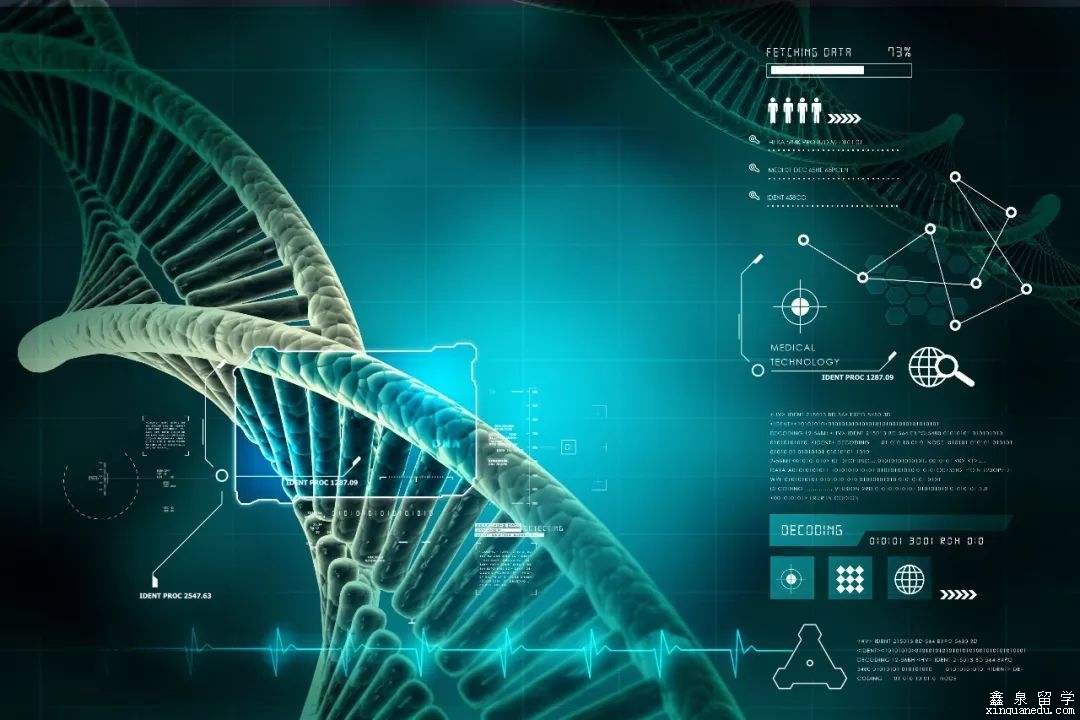
生物信息学作为一门新的学科领域,它是把基因组DNA序列信息分析作为源头,在获得蛋白质编码区的信息后进行蛋白质空间结构模拟和预测,然后依据特定蛋白质的功能进行必要的药物设计。基因组信息学,蛋白质空间结构模拟以及药物设计构成了生物信息学的3个重要组成部分。从生物信息学研究的具体内容上看,生物信息学应包括这3个主要部分:⑴新算法和统计学方法研究;⑵各类数据的分析和解释;⑶研制有效利用和管理数据新工具。
生物信息学基本上只是分子生物学与信息技术(尤其是因特网技术)的结合体。生物信息学的研究材料和结果就是各种各样的生物学数据,其研究工具是计算机,研究方法包括对生物学数据的搜索(收集和筛选)、处理(编辑、整理、管理和显示)及利用(计算、模拟)。
进入21世纪后,生命科学的发展重点从人类基因组测序转向了基因功能、蛋白质功能探测,美国又率先拉开了以蛋白质和药物基因学为研究重点的后基因组时代的帷幕。时至今日,美国崛起了波士顿、旧金山湾、华盛顿、圣迭戈和北卡研究三角园等5大生物产业基地,成为地方经济支柱和美国生物技术产业化的基础。五大基地拥有实力雄厚的大学和研究机构做强大后盾。如波士顿的哈佛大学和麻省理工学院,旧金山湾区的加州大学旧金山分校、加州大学伯克利分校、斯坦福大学,大华府地区则云集了一批世界级的教学、研究、管理机构,如美国国家卫生研究院、美国食品和药品管理局、霍华德·休斯医学院研究实验室、马里兰大学研究中心和约翰·霍普金斯大学等。北卡罗来纳研究三角园则毗邻北卡罗来纳州著名的杜克大学和北卡罗来纳大学查波尔希尔分校。
美国生物信息学专业研究方向:
生物信息学的主要研究方向:基因组学 - 蛋白质组学 - 系统生物学 - 比较基因组学,1989年在美国举办生物化学系统论与生物数学的计算机模型国际会议,生物信息学发展到了计算生物学、计算系统生物学的时代。
1、序列比对(Sequence Alignment)
2、蛋白质结构比对和预测
3、基因识别、非编码区分析研究
4、分子进化和比较基因组学
5、序列重叠群(Consigns)装配
6、遗传密码的起源
7、基于结构的药物设计
8、生物系统的建模和仿真
9、生物信息学技术方法的研究
10、生物图像
姑且不去引用生物信息学冗长的定义,以通俗的语言阐述其核心应用即是:随着包括人类基因组计划在内的生物基因组测序工程的里程碑式的进展,由此产生的包括生物体生老病死的生物数据以前所未有的速度递增,已达到每14个月翻一番的速度。同时随着互联网的普及,数以百计的生物学数据库如雨后春笋般迅速出现和成长。然而这些仅仅是原始生物信息的获取,是生物信息学产业发展的初级阶段,这一阶段的生物信息学企业大都以出售生物数据库为生。以人类基因组测序而闻名的塞莱拉公司即是这一阶段的成功代表。
美国生物信息学专业就业前景:
生物技术一直是美国政府所支持的重点产业领域,包括克隆在内的尖端研究都是在政府的大力支持下所进行的,所以相关生物学专业的就业状况一直以来都是趋向于良好发展。从1997年到2002年,美国的经济形势大好,NIH持续大笔的投入,于是新的职位大量产生。无论是在研究机关或者生物公司,投资每年都以超过7%速度增长。而职位的增长速度也保持在4-5%左右。
可以看到,美国大学生物专业是一个交叉性十分强的学科,伴随科技飞速发展,学科划分越来越细,学科交叉性越来越强,许多生物相关的新兴学科方兴未艾。生物医学工程、生物统计学、生物信息学等学科在就业市场上已经展现出了其独特的优势,具备这样交叉学科技术的复合型高素质人才在就业市场上十分抢手。此外,生物相关的应用类学科包括公共卫生、食品、营养等,人才缺口也较基础研究类大。
美国生物信息学专业就业方向:
生物信息学专业虽然就业前景不错,但是还是需要毕业生有牢固的基础知识和专业技能。生物信息学专业学生主要学习生物信息学的基本理论和方法,受到相关科学实验和科学思维的基本训练,具有较好的分子生物学、计算机科学与技术、数学和统计学素养,具备生物信息的收集、分析、挖掘、利用等方面的基本能力,具有较好的业务素质,能在科研机构、高等院校、医疗医药、环境保护等相关部门与行业从事教学、科研、管理、疾病分子诊断、药物设计、生物软件开发、环境微生物监测等工作的高级科学技术人才。
鑫泉留学沈阳分公司赵禹湘老师为大家详细介绍美国开设生物信息学专业的大学以及录取要求和课程简介等内容,都是绝对的干货哦!
波士顿大学生物信息学专业介绍
官网地址:http://www.bu.edu/
MS in Bioinformatics 生物信息学
http://www.bu.edu/academics/grs/programs/bioinformatics/ms/
Course Requirements
The master’s degree requires 32 credits of coursework. In order to receive a master’s degree, students must demonstrate mastery of the required subject matter (no lower than a B in all required courses). Course requirements are as follows:
CAS BI 552 Molecular Biology I (Students may take CAS BI 553, Molecular Biology II, if approved by their advisor)
ENG BE 562 Computational Biology: Genomes, Networks, Evolution (Students with no prior experience or exposure to bioinformatics application should take ENG BF 527, Bioinformatics Applications, before taking ENG BE 562)
ENG BF 768 Biological Database Systems
ENG BF 778 Physical Chemistry for Systems Biology
ENG BF 821 Bioinformatics Graduate Seminar (2 cr each; 4 cr total)
ENG BF 541 Bioinformatics Internship
硕士学位课程需要32学分。为了获得硕士学位,学生必须证明掌握所需的主题(在所有必修课程中不低于B)。课程要求如下:
CAS BI 552分子生物学I(学生可以参加CAS BI 553,分子生物学II,如果他们的顾问批准)
ENG BE 562计算生物学:基因组,网络,进化(没有经验或接触过生物信息学应用的学生应该参加ENG BF 527,生物信息学应用,然后再参加ENG BE 562)
ENG BF 768生物数据库系统
ENG BF 778用于系统生物学的物理化学
ENG BF 821生物信息学研究生研讨会(每个2 cr;总共4 cr)
ENG BF 541生物信息学实习
必修课程的实施将根据以前记录的学术和/或工作经验确定。学生及其顾问将向课程委员会申请此类同等学历。当过去的工作或替代课程被接受为核心等效课程时,学生的顾问将推荐其他课程以完成20个核心学分。应该采用高级选修课程来取代任何放弃的课程要求。
完成硕士学位要求所需的其余学分将包括选修课和/或其他研究项目。
Fall 2019 Core Courses
ENG BE 562: Computational Biology: Genomes, Networks, Evolution
ENG BF 751: Molecular Biology and Biochemistry for Bioinformatics
GRS MA 681: Accelerated Introduction to Statistical Methods for Quantitative Research
ENG BF 690: Bioinformatics Challenge Project
ENG BF 810: Bioinformatics PhD Laboratory Rotation
ENG BF 820: Bioinformatics Research Opportunities
ENG BF 821: Bioinformatics Graduate Seminar
CAS BI 552: Molecular Biology I
ENG BF 831: Translational Bioinformatics Seminar
Electives
Spring 2019 Core Courses
ENG BF 768-A1: Biological Database Systems
ENG BF 690-A1: Bioinformatics Challenge Project
ENG BF 571-A1: Dynamics and Evolution of Biological Networks
ENG BF 528-A1: Applications in Translational Bioinformatics
ENG BF 752-A1: Legal and Ethical Issues of Science and Technology
ENG BF 810-A1: Laboratory Rotation System
ENG BF 821-A1: Bioinformatics Graduate Seminar
Electives
课程设置
2019年秋季 核心课程
ENG BE 562:计算生物学:基因组,网络,进化
ENG BF 751:生物信息学的分子生物学和生物化学
GRS MA 681:定量研究统计方法的加速介绍
ENG BF 690:生物信息学挑战项目
ENG BF 810:生物信息学博士实验室轮换
ENG BF 820:生物信息学研究机会
ENG BF 821:生物信息学研究生研讨会
CAS BI 552:分子生物学I.
ENG BF 831:转化生物信息学研讨会
选修课
2019年春季 核心课程
ENG BF 768-A1:生物数据库系统
ENG BF 690-A1:生物信息学挑战项目
ENG BF 571-A1:生物网络的动力学和演化
ENG BF 528-A1:转化生物信息学中的应用
ENG BF 752-A1:科学技术的法律和伦理问题
ENG BF 810-A1:实验室旋转系统
ENG BF 821-A1:生物信息学研究生研讨会
选修课
MS计划要求
The master’s degree requires a total of 32 credits. MS candidates must demonstrate mastery of the core subject matter (no lower than a “B” in core courses) to fulfill their degree requirements. Students must also demonstrate a working knowledge of computational methods available to the modern bioinformatician through the successful completion of a 400-hour internship project, followed by a written and oral report which will serve as a master’s thesis. Fulfillment of core course equivalents will be determined based on documented previous academic and/or work experience. If an alternate course has been accepted as a core equivalent, the academic advisor will recommend a courses to fulfill the requirements.
硕士学位共需要32学分。MS候选人必须证明掌握核心课程(不低于核心课程中的“B”)才能满足他们的学位要求。学生还必须通过成功完成400小时的实习项目,然后通过书面和口头报告作为硕士论文,展示现代生物信息学家可用的计算方法的工作知识。核心课程等效课程的实施将根据以前记录的学术和/或工作经验确定。如果替代课程已被接受为核心等效课程,学术顾问将推荐一门课程来满足要求。
Core Courses
ENG BE 562: Computational Biology: Genomes, Networks, Evolution
The algorithmic and machine learning foundations of computational biology, combining theory with practice are covered. Principles of algorithm design and core methods in computational biology, and an introduction of important problems in computational biology. Hands-on experience analyzing large-scale biological data sets. 4 cr.
OR
ENG BF 528: Applications in Translational Bioinformatics
Bioinformatics is an interdisciplinary field devoted to managing and analyzing largescale biological data, such as the DNA sequence of the human genome, and has become an essential tool in interpreting and translating biological knowledge for use in a clinical setting. This course introduces graduate and upper–level undergraduate students to the principles of bioinformatic analysis applied to translational studies. Application topics will include gene expression analysis, biomarker development, and Genome Wide Association Studies (GWAS). Bioinformatics methods including microarray analysis, short read sequence analysis, biological pathways and geneset enrichment analysis, and Quantitative Trait Loci (QTL) will be covered. Lectures and assignments will be designed around reproducing the results of preselected studies from the literature that exemplify the topics. The primary focus will be using existing software tools and published data to perform analyses, but most tasks will require some programming. 4 cr.
ENG BE 768: Biological Database Systems
Describes relational data models and database management systems; teaches the theories and techniques of constructing relational databases to store various biological data, including sequences, structures, genetic linkages and maps, and signal pathways. Introduces relational database query language SQL and the ORACLE database management system, with an emphasis on answering biologically important questions. Summarizes currently existing biological databases. Describes web-based programming tools to make databases accessible. Addresses questions in data integration and security. The future directions for biological database development are also discussed. 4 cr.
ENG BF 571: Dynamics and Evolution of Biological Networks
This course focuses on mathematical models for exploring the organization, dynamics, and evolution of biochemical and genetic networks. Topics include: introductions to metabolic and genetic networks, deterministic and stochastic kinetics of biochemical pathways; genome-scale models of metabolic reaction fluxes; models of regulatory networks; modular architecture of biological networks. 4 cr.
ENG BF 831: Translational Bioinformatics Seminar
After commencing briefly with general introductory material (published reviews and other relevant back-ground information), students will proceed to examine, discuss and evaluate recent papers that directly illustrate the use of bioinformatics either in pre-clinical or clinical research settings. Papers will be drawn from high-impact journals such as Nature, Science, PNAS, Cell, and Science Translational Medicine. Students will take turns presenting the papers to the class and provide a critical review of each. They will also complete a term paper in the form of a research proposal directed to the goal of using bioinformatics to advance a medical intervention (e.g. prognostic, diagnostic or therapeutic). Brief guest presentations by researchers in BUSM laboratories will be arranged as appropriate. Previous guest facilitators have included faculty from the Department of Biostatistics, Section of Computational Biomedicine, and Department of Mathematics and Statistics as well as industry leaders. 2 cr.
CAS BI 552: Molecular Biology I
Synthesis, structure, and function of biologically important macromolecules (DNA, RNA, and proteins). Regulation and control of the synthesis of RNA and proteins. Introduction to molecular biology of eukaryotes. Discussion of molecular biological techniques, including genetics and recombinant DNA techniques. 4 cr.
OR
ENG BF 751: Molecular Biology and Biochemistry for Bioinformatics
Modern research in the life sciences is an increasingly interdisciplinary endeavor where new fields of study have developed at the interfaces of biology, chemistry, physics, mathematics, and computer science. In many instances, the development of these new fields goes hand in hand with development of new experimental approaches to surveying the content of the cell. While, traditional molecular cell biology and biochemistry courses often focus on the basic details of cell physiology and macromolecular (DNA, lipid, protein) structures, they too often neglect the quantitative aspects of number, scale, forces, etc. that are crucial to providing a larger context within living systems. This course aims at reframing the basic concepts of cell and molecular biology in a quantitative context and providing a basic overview of some of the key approaches used to develop a quantitative framework inside the cell. How this detailed information can then be applied to bioinformatics research problems will also be explored. 4 cr.
Internship Projects
MS students in the BU Bioinformatics Program have completed internships at more than 100 labs, hospitals, universities and biotech companies, including New England Biolabs, the MIT Lincoln Laboratory, the Hospital Corporation of America, Novartis, Takeda, Biogen and the Bioinformatics HUB, a BU pilot project started by Adam Labadorf, a 2015 Bioinformatics PhD alum. Read more about the internship projects at the HUB here.
核心课程
ENG BE 562:计算生物学:基因组,网络,进化
涵盖了计算生物学的算法和机器学习基础,理论与实践相结合。计算生物学中的算法设计原理和核心方法,以及计算生物学中的重要问题的介绍。分析大规模生物数据集的实践经验。4点
或者
ENG BF 528:转化生物信息学中的应用
生物信息学是一个跨学科领域,致力于管理和分析大规模生物数据,如人类基因组的DNA序列,并已成为解释和翻译生物知识用于临床环境的重要工具。本课程向研究生和高年级本科生介绍应用于转化研究的生物信息学分析原理。应用主题包括基因表达分析,生物标志物开发和基因组广泛关联研究(GWAS)。将涵盖生物信息学方法,包括微阵列分析,短读序列分析,生物途径和基因组富集分析,以及数量性状基因座(QTL)。讲座和作业将围绕从主题例证的文献中再现预选研究的结果而设计。主要关注点是使用现有的软件工具和发布的数据来执行分析,但大多数任务都需要一些编程。4点
ENG BE 768:生物数据库系统
描述关系数据模型和数据库管理系统; 教授构建关系数据库以存储各种生物数据的理论和技术,包括序列,结构,遗传连锁和图谱以及信号通路。介绍关系数据库查询语言SQL和ORACLE数据库管理系统,重点是回答生物学上重要的问题。总结了现有的生物数据库。描述基于Web的编程工具以使数据库可访问。解决数据集成和安全性方面的问题。还讨论了生物数据库开发的未来方向。4点
ENG BF 571:生物网络的动力学和演化
本课程重点介绍用于探索生化和遗传网络的组织,动态和演化的数学模型。主题包括:代谢和遗传网络的介绍,生化途径的确定性和随机动力学; 代谢反应通量的基因组规模模型; 监管网络模型; 生物网络的模块化架构。4点
ENG BF 831:转化生物信息学研讨会
在简要介绍一般介绍性材料(已发表的评论和其他相关背景信息)之后,学生将继续研究,讨论和评估最近直接说明生物信息学在临床前或临床研究环境中使用的论文。论文将来自高影响力的期刊,如Nature,Science,PNAS,Cell和Science Translational Medicine。学生将轮流向全班展示论文,并对每篇论文进行严格审核。他们还将以研究提案的形式完成学期论文,该研究提案旨在使用生物信息学来推进医学干预(例如预后,诊断或治疗)。将酌情安排BUSM实验室研究人员的简短嘉宾演讲。以前的客座辅导员包括生物统计学系,计算生物医学系,数学与统计系以及行业领导者。2点
CAS BI 552:分子生物学I.
生物学上重要的大分子(DNA,RNA和蛋白质)的合成,结构和功能。调节和控制RNA和蛋白质的合成。真核生物分子生物学概论。讨论分子生物学技术,包括遗传学和重组DNA技术。4点
或者
ENG BF 751:生物信息学的分子生物学和生物化学
生命科学领域的现代研究是一门越来越跨学科的研究,新的研究领域已经在生物学,化学,物理学,数学和计算机科学的界面上发展起来。在许多情况下,这些新领域的发展与开发用于测量细胞内容的新实验方法密切相关。虽然传统的分子细胞生物学和生物化学课程往往侧重于细胞生理学和大分子(DNA,脂质,蛋白质)结构的基本细节,但它们往往忽略了数量,规模,力量等对提供物质至关重要的数量方面。生活系统中的更大背景。本课程旨在以定量的方式重构细胞和分子生物学的基本概念,并提供一些用于在细胞内部开发定量框架的关键方法的基本概述。此外,还将探讨如何将这些详细信息应用于生物信息学研究问题。4点
实习项目
BU生物信息学项目的硕士生已经完成了100多个实验室,医院,大学和生物技术公司的实习,包括新英格兰Biolabs,麻省理工学院林肯实验室,美国医院公司,诺华,武田,Biogen和生物信息学中心, BU试点项目由2015年生物信息学博士明星Adam Labadorf开始。在这里阅读更多关于HUB的实习项目。
http://bubhub.bumc.bu.edu/about/
申请要求
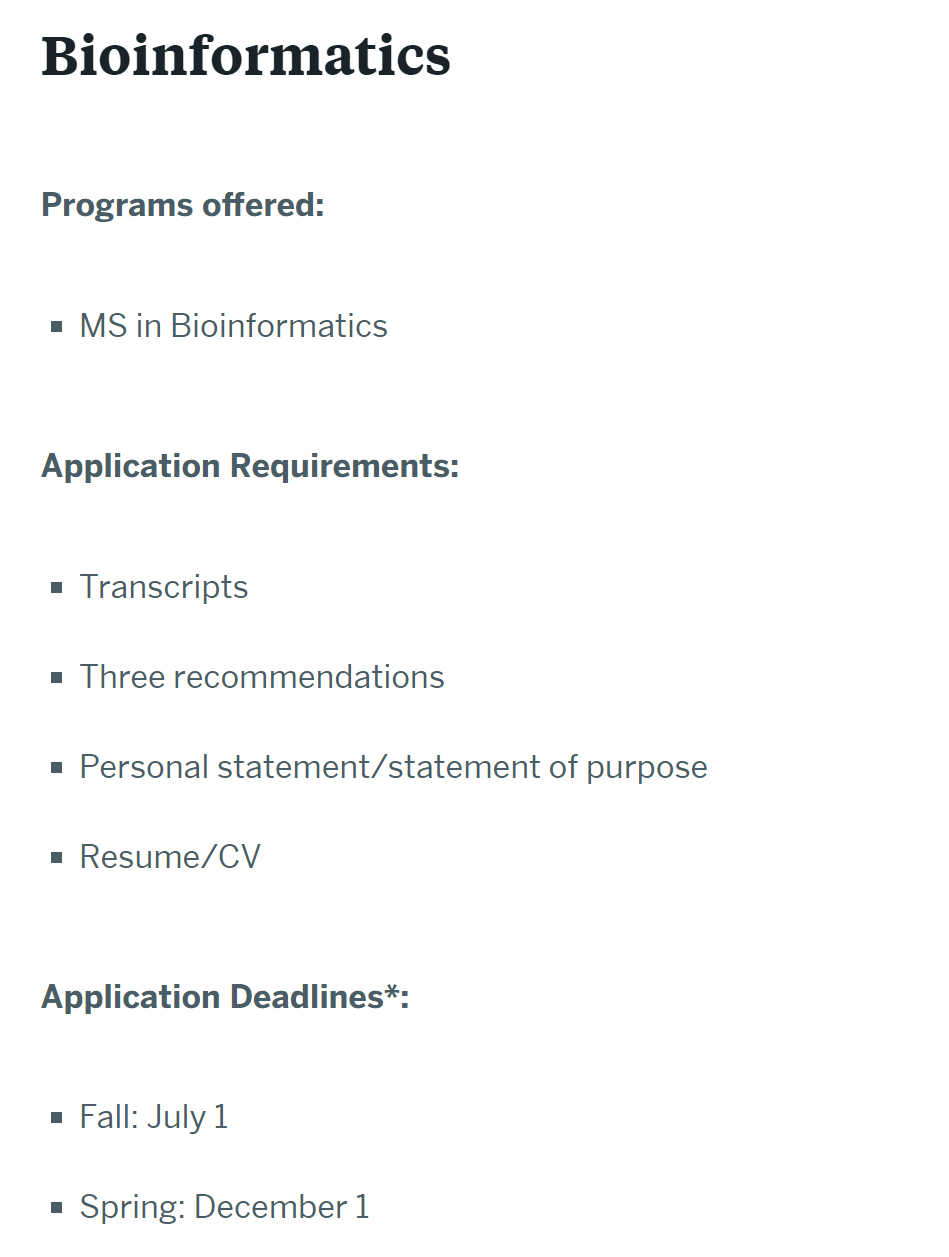

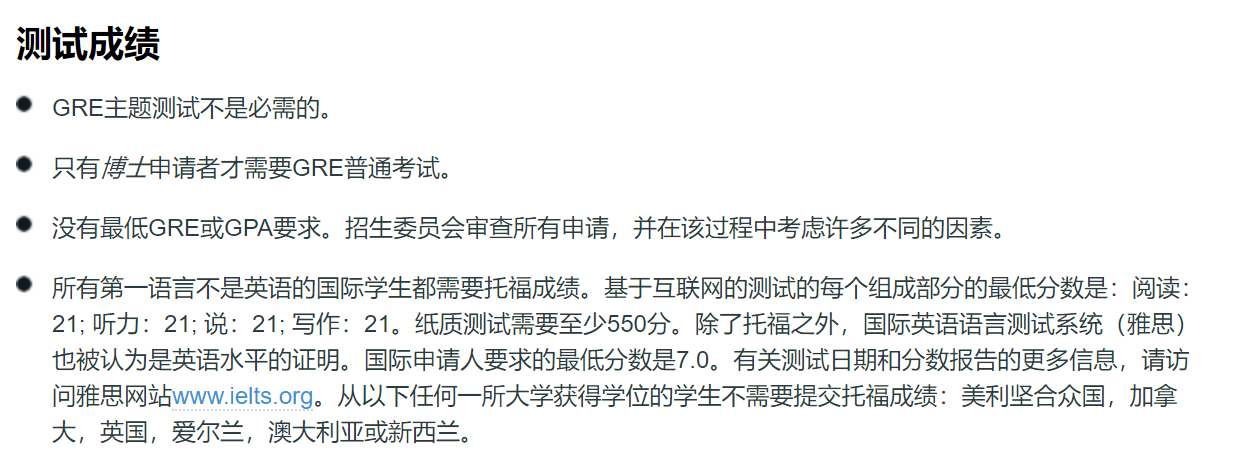
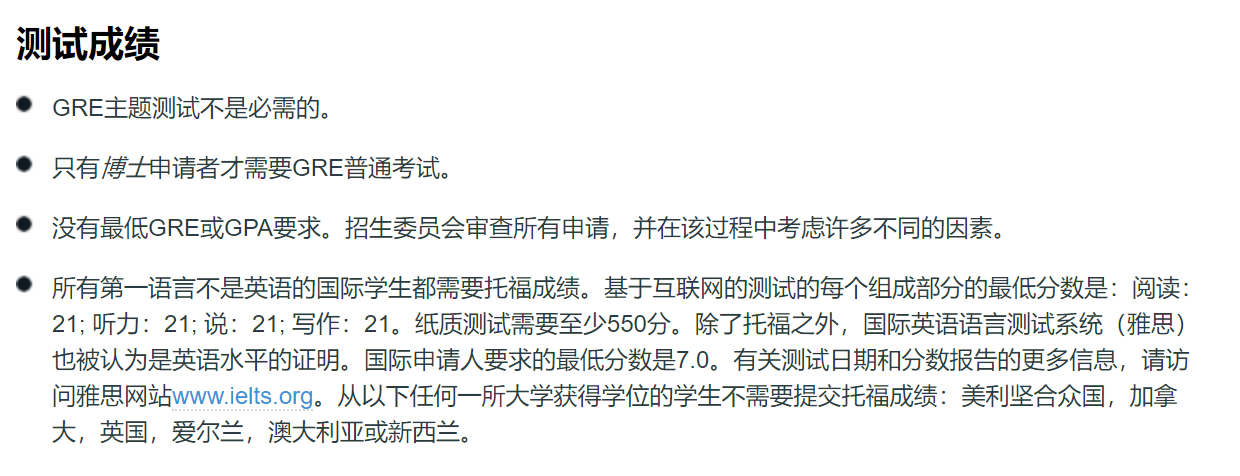
东北大学生物信息学专业介绍
官网地址:https://www.northeastern.edu/
生物信息学专业硕士Master of Science program in Bioinformatics
https://www.northeastern.edu/graduate/program/master-of-science-in-bioinformatics-boston-14244/
Northeastern University’s Master of Science program in Bioinformatics provides cross-disciplinary training in biology, computer science, and informational technology for today’s cutting-edge jobs in the biotechnology and pharmaceutical industries.
东北大学生物信息学硕士课程为当今生物技术和制药行业的尖端工作提供生物学,计算机科学和信息技术方面的跨学科培训。MS in Bioinformatics requires 32 credit hours
学费:48100美金
Requirements 录取要求
Online application
Application fee
Unofficial transcripts for all institutions attended
(Official transcripts required upon acceptance of admission offer)
Personal statement
Two letters of recommendation
GRE scores recommended, but not required
Proof of English Proficiency for all applicants (from one of the following):
Degree earned or in progress at a U.S. institution
Degree earned or in progress at an institution where English is the only medium of instruction
Official exam scores from either the TOEFL iBT, IELTS, or PTE exam
https://cos.northeastern.edu/bioinformatics/academics/admissions-requirements-materials/#_ga=2.212278801.48703453.1553840365-876247839.1542353429
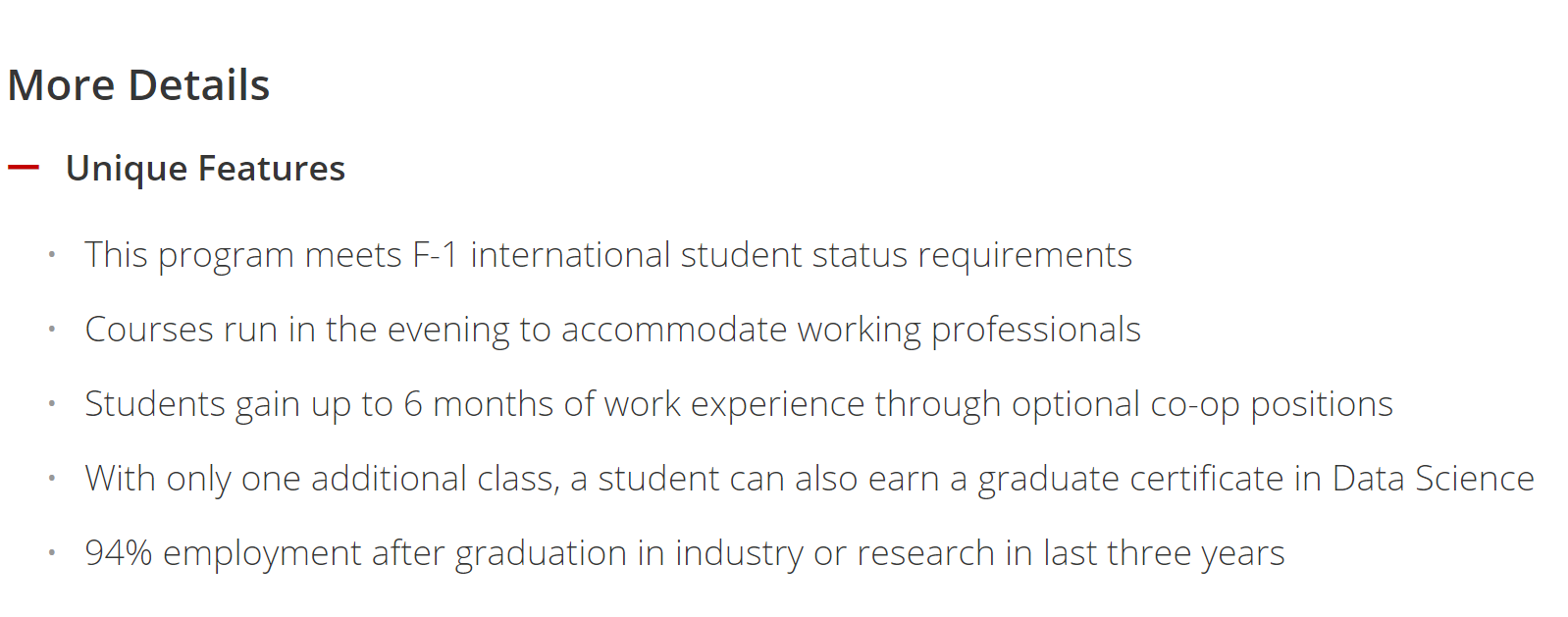


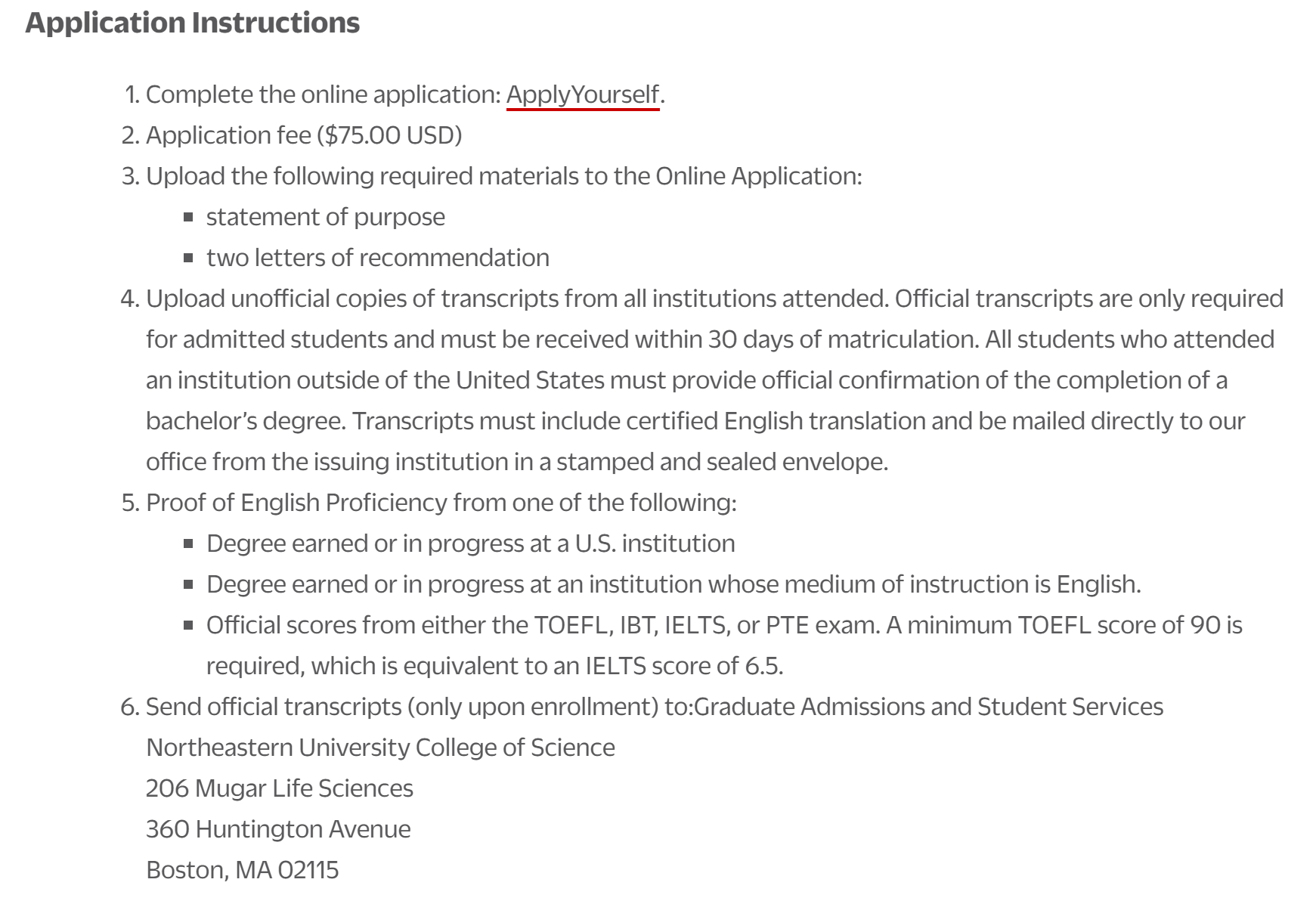
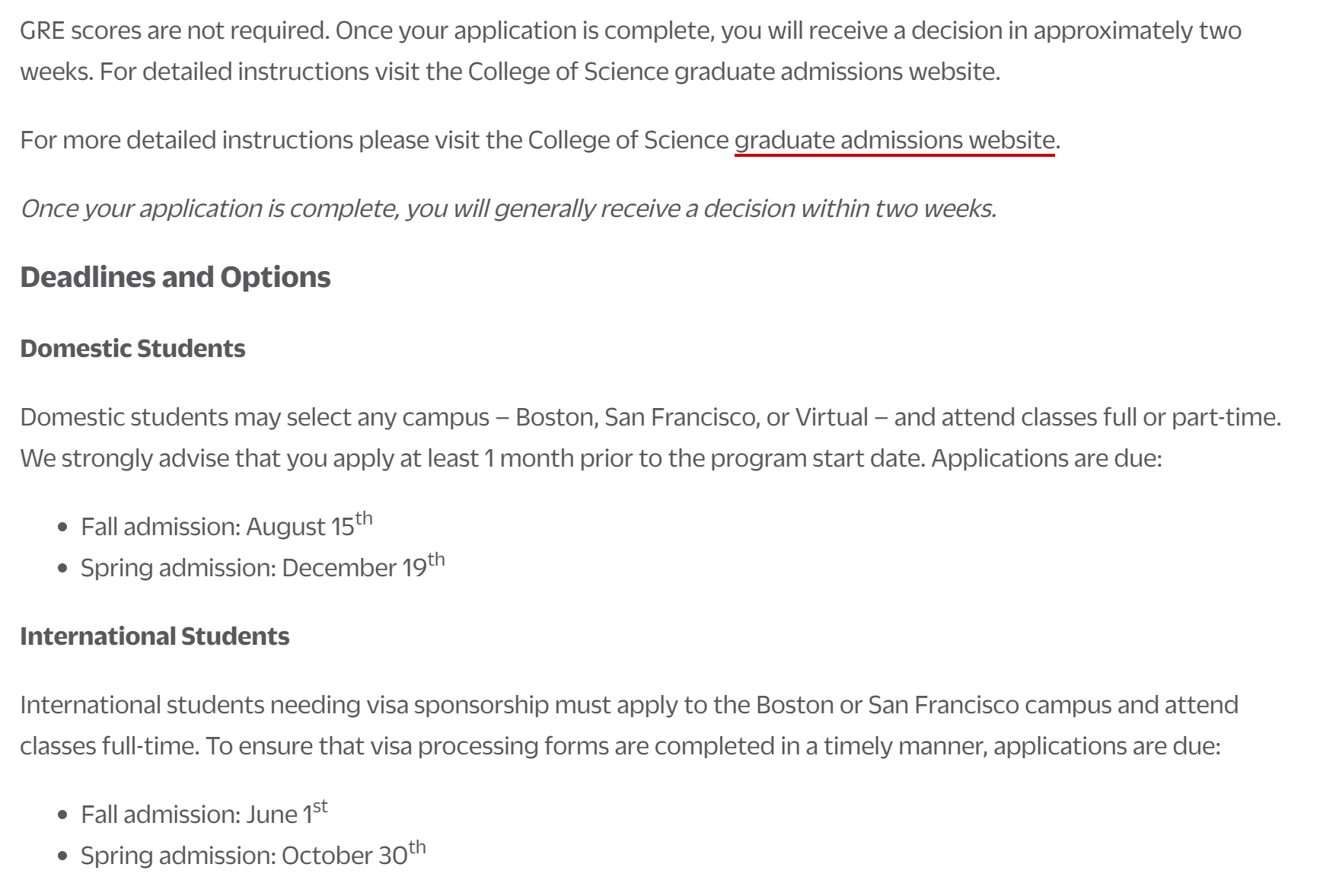
最后附上全美生物数学和生物信息学专业TOP20院校榜单还有赵老师申请成功的一个美国东北大学生物信息学专业案例offer展示,希望对你的院校选择祝一臂之力。
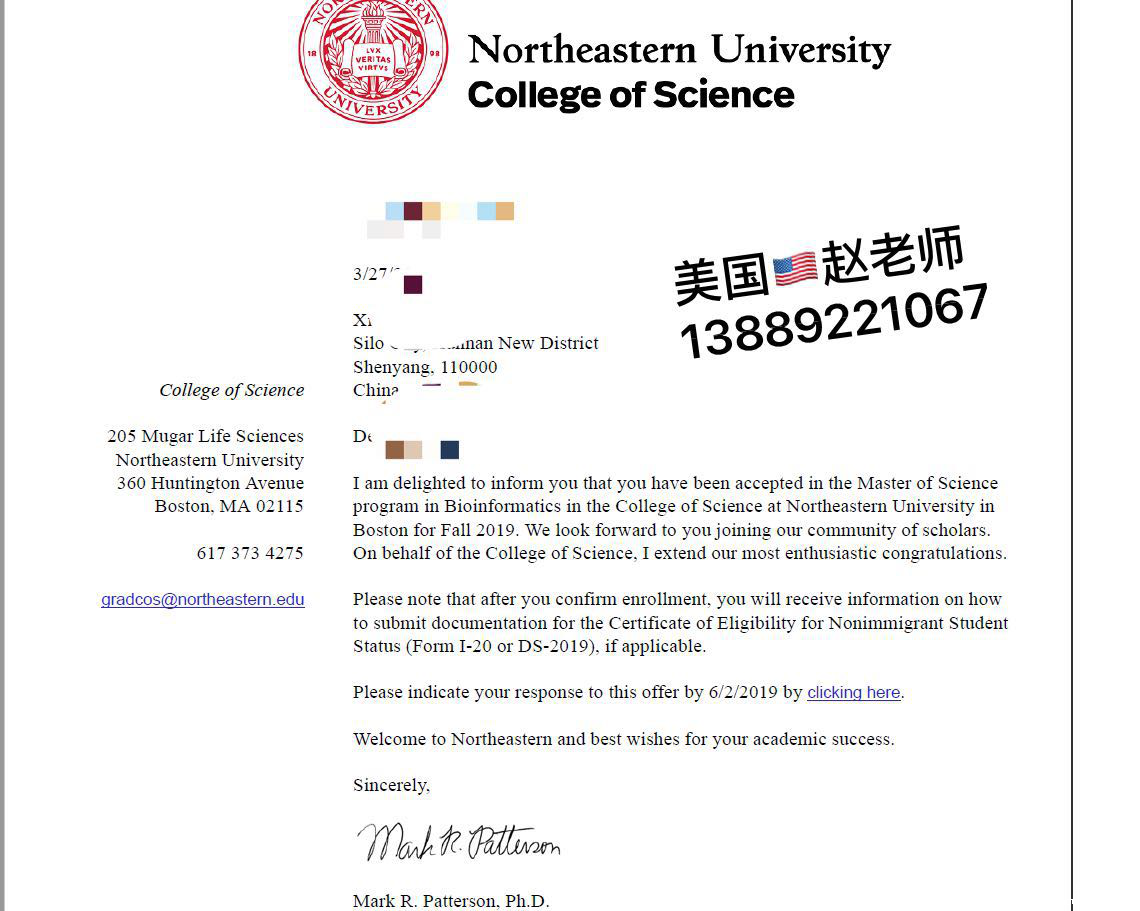
美国大学生物数学和生物信息学专业排名TOP20
贝勒大学 Baylor University
查塔姆大学 Chatham University
克拉夫林学院 Claflin University
达文波特大学 Davenport University
甘农大学 Gannon University
芝加哥洛约拉大学 Loyola University Chicago
密歇根理工大学 Michigan Technological University
新泽西理工学院 New Jersey Institute of Technology
纽约大学理工学院 Polytechnic Institute of New York University
新泽西拉玛珀学院(玛华) Ramapo College of New Jersey
伦斯勒理工学院 Rensselaer Polytechnic Institute
罗彻斯特理工学院 Rochester Institute of Technology
罗克赫斯特大学 Rockhurst University
圣爱德华大学 St. Edward's University
圣文森特学院 St. Vincent College
圣地亚哥州立大学 San Diego State University
纽约州立大学-水牛城分校 University at Buffalo SUNY
加州大学圣克鲁斯分校 University of California--Santa Cruz
丹佛大学 University of Denver
马里兰大学巴尔的摩县分校 University of Maryland Baltimore County
本文作者:鑫泉留学沈阳分公司美加留学规划师 赵禹湘老师
想要申请美国的生物信息学专业,可以点击这里与赵老师在线沟通,免费评估一下你的申请条件做个留学方案给你吧!
鑫泉出国全国品牌留学机构,提供最新留学资讯,为您成功留学不遗余力!如有疑问欢迎拨打以下咨询热线:
资讯来源:鑫泉留学
责任编辑:孙卉




